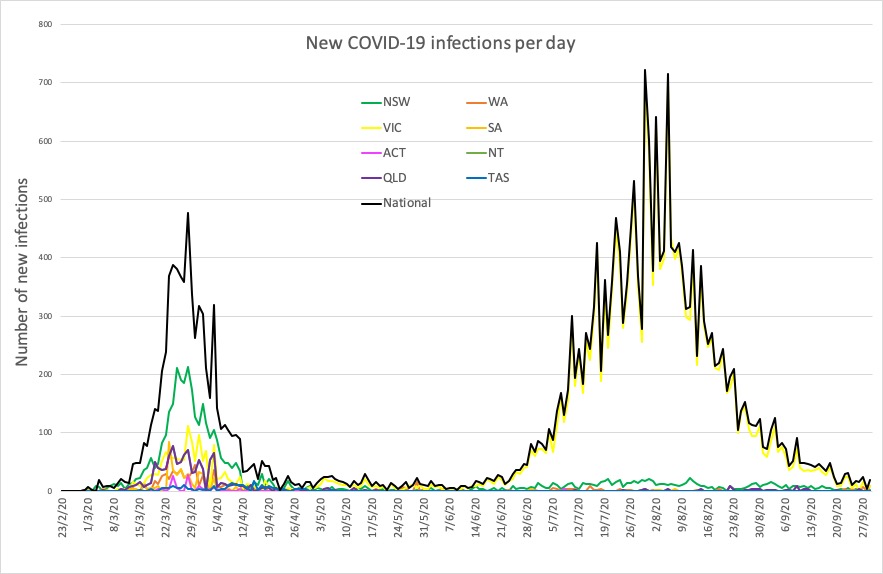An Australian study has provided further evidence of transmission of COVID-19 on an aeroplane flight from Sydney to Perth.
Welcome to The Medical Republic‘s COVID Catch-Up.
It’s the day’s COVID-19 news in one convenient post. Email bianca@biancanogrady.com with any tips, comments or feedback.
30 September
- More evidence of in-flight transmission of COVID-19 from domestic Australian flight.
- Two healthcare workers show reinfection with genetically different SARS-CoV-2 strains
- Decline in electricity consumption in NY during pandemic can be seen from space.
- One million lives lost globally to COVID-19.
- The latest confirmed COVID-19 infection numbers from around Australia.
- An Australian study has used whole genome sequencing to provide further evidence of in-flight transmission of COVID-19.
Writing in Emerging Infectious Diseases, researchers reported the findings of a study of 29 passengers on board a domestic flight from Sydney to Perth who later tested positive for SARS-CoV-2, 19 of whom had recently disembarked from cruise ships including the Ruby Princess and nine of these were considered to have been infectious during the flight.
The remaining ten positive cases were either international travellers transiting through Australia or domestic travellers with no connection to the cruise ships.
Altogether there were 18 primary cases – all but one from cruise ships – and 11 secondary cases, eight of which were judged to have resulted from in-flight transmission. Sequencing of 25 of the cases revealed that 20 were clustered with the Ruby Princess, and this sequence had not been recorded anywhere else before that outbreak.
Of the 11 secondary cases, eight were seated within two rows of the infectious Ruby Princess passengers, three were three rows away, and one was six rows away. Two-third of the secondary cases had window seats. - Two healthcare workers in India have been reinfected with genetically different strains of SARS-CoV-2, according to a report in Clinical Infectious Diseases.
The two workers, both in their twenties, were working at a COVID-19 unit in a hospital when they tested positive for SARS-CoV-2. They were asymptomatic but were hospitalised and released a week or two later after testing negative. Both then tested positive again three and four months later, again with asymptomatic disease but with a higher viral load than in their first infection. Genomic sequencing revealed each had a genetically different strain for their second infection compared to their first, which the authors said ruled out the second positive tests as being the result of persistent viral shedding or reactivation. - The drop in electricity consumption associated with the COVID-19 pandemic in New York City can be seen from space, researchers have found.
A study published in Joule combined market data on electricity consumption with data on public health, weather, mobile device location and satellite imagery to explore the impact of the pandemic on electricity use in New York City in April and May this year.
The market data suggested 6%-10% reductions in electricity use in April, and 4%-10% reductions in May, and night-time light images from satellites clearly show a dimming in the usually brightly-lit city over the same period. - The COVID-19 pandemic has reached a dismal milestone of one million deaths globally, one-fifth of which have occurred in the United States alone. Brazil has the second highest number of deaths – just over 141,000 – followed by India with around 96,000 deaths.
In comparison, the 1918 influenza pandemic is estimated to have claimed as many as 50 million lives. - Western Australia’s tally continues to increase as more crew members of the Patricia Oldendorff test positive. New South Wales reports two new cases but both are in returned travellers. Victoria’s ten new cases are all linked to known outbreaks.
Here are the latest confirmed COVID-19 infection numbers from around Australia, to 9pm Tuesday:
National – 27,063, with 882 deaths
ACT – 113 (0)
NSW – 4220 (2)
NT – 33 (0)
QLD – 1157 (0)
SA – 468 (0)
TAS – 230 (0)
VIC – 20,158 (10)
WA – 684 (8)



